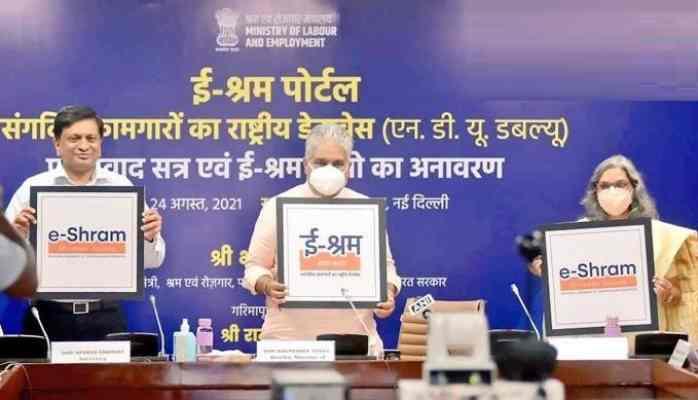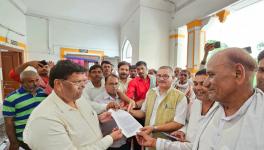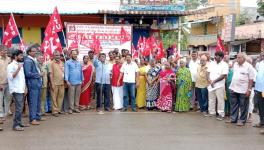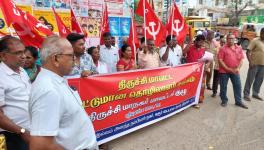Workers’ Groups Welcome e-SHRAM Portal, but also Point Out Issues

Image Courtesy: SightsIn Plus
The new portal for the creation of a national database of unorganised workers in the country, launched on Thursday, August 26 after the Supreme Court came down hard upon the Union Labour Ministry earlier last month, invited concerns and suggestions from the trade unions and workers’ bodies. While the workers' bodies have welcomed it as a 'positive step', they have pointed out that it does not come without issues.
Labour Minister Bhupendra Yadav on Thursday launched the e-SHRAM portal as part of the Central Government’s exercise to register the country’s estimated 38 crore unorganised sector workers, eventually leading to the creation of National Database of Unorganised Workers (NDUW).
As part of the exercise, every registered worker would get what will be known as an “e-SHRAM” card, which will carry a 12-digit number. The Narendra Modi-led government eventually aims to use this database to integrate social security schemes for the unorganised workers.
Construction workers, migrant workers, street vendors, domestic workers, milkmen, truck drivers, fishermen, agricultural workers, gig and platform workers among others will be covered by the initiative, as per the central government.
Trade unions and workers’ associations, which the central government is now hoping to bring on board to mobilise labourers for registration to the portal, however, see it as yet another exercise to register the growing informal workers in the country that does not come without any issues.
The prominent concerns that they have raised include that the process of registration itself that could lead to exclusion of many workers. They have also said that the because there is no clarity yet on the benefits that a registered worker will receive, the targeted workers may not show much eagerness in getting their registrations done.
“This is not the first that the registration of the unorganised workers is being sought to achieve,” said Sourya Mazumdar of Migrants Worker Solidarity Network (MWSN). “As for the migrant workers in particular, already there are provisions under several laws, including the 1979 Inter-State Migrant Workmen Act and the Factories Act, which had mandated the registration of these workers.”
Given this, Mazumdar reasoned, that the issue is not the lack of provisions for registration of unorganised workers, but their proper implementation. “We will only have to see how that will work out with this new exercise. We hope that it does lead to creation of a comprehensive database,” he said.
The lack of such a database and its need—arguably more than ever—was particularly felt last year following a sudden announcement of pandemic-induced nationwide lockdown that had triggered a mass exodus of migrant workers. The absence of any data had only made it difficult for the State machineries to provide relief, thereby deepening the miseries of these workers.
The Working People’s Charter (WPC), a network of various workers’ bodies, said in a statement on Thursday that while it celebrates the initiative as a “positive step”, the “heavy price paid for this,” by the workers must be acknowledged.
“It is imperative to remember the vast constituency of working families who continue to toil each day without any governmental support and only time will tell if this database proves to be effective in delivering justice for the informal workers and restoring their dignity,” the statement said.
The WPC’s statement also notes that the elderly workers, above the age of 60, are being “arbitrarily excluded” from getting registered to the portal and thereby, from the benefits of it.
Dharmendra Kumar of Janpahal, a Delhi-based NGO that started helping informal workers with their registration on the government’s portal, said that there are multiple concerns regarding the process of registration.
According to him, the mandatory linking of Aadhaar card will lead to exclusion of some workers. The Central Government, on the other hand, claims that by authenticating the database with Aadhaar, 97% coverage of the targeted working population is ensured.
However, there are more issues at hand. “The Aadhaar must be linked with an active mobile number. In our case, we found that most of the workers coming for registration have changed their mobile numbers and thus face problems,” Kumar said.
In a presentation to the Central Trade Unions earlier on Tuesday this week, Labour Minister Yadav pointed out that around one lakh common service centres (CSC) will be put in place across the country to facilitate registration. Kumar on Friday told NewsClick that these CSCs will help the workers in authenticating their Aadhaar through finger print verifications.
“But then, the reach of CSCs is very limited. The government must, instead, allow the trade unions or associations to carry out this process of registration through a user ID and password,” he said.
Another thing that Kumar pointed out was the lack of clarity on the benefits that the worker will receive after getting registered. “Due to this, the exercise may reach a stage when many workers may not show eagerness to get themselves registered,” he said.
The Union Labour Ministry in its press release on Thursday said that a registered worker with the portal will be covered with an accidental insurance cover worth Rs 2 lakh. This means that a worker with an e-SHRAM card will be eligible for Rs. 1 lakh on partial disability and Rs. 2 lakh on permanent disability or death.
Subhash Bhatnagar of the National Campaign Committee For Central Legislation on Construction Labour (NCCC-CL) claimed that the government is only creating a big confusion. “When you say that you want to get construction workers to be registered with the new portal then what will happen to their sectoral welfare boards with which the workers are registered for years?" He asked.
Tapan Sen of Centre of Indian Trade Unions (CITU) told NewsClick on Friday that the central trade union will support the unorganised sector workers in getting them registered with the e-SHRAM portal. He however pointed out that it was only after the Supreme Court directions that a database is being created.
Last month, an apex court bench had slammed the Labour Ministry for its “unpardonable apathy” in not completing the work of the NDWU portal to register and identify migrant workers and unorganised labourers to ensure their rights, welfare and food security. The court’s remarks came in a suo moto case that it had taken up on May 26 last year concerning the welfare of migrant workers amid the COVID-19 pandemic.
Subsequently, the Centre was ordered to complete the work on the portal by July 31 and complete the registration of workers by December 31.
“Trade Unions have been demanding the registration of unorganised workers for far too long,” Sen said. Time and again, he added, concrete recommendations on this issue were also made by government bodies too.
Sen also said given that not all workers posses Aadhaar, the central trade union has demanded that arrangements should also be made for off-line registration.
Get the latest reports & analysis with people's perspective on Protests, movements & deep analytical videos, discussions of the current affairs in your Telegram app. Subscribe to NewsClick's Telegram channel & get Real-Time updates on stories, as they get published on our website.
























